Remington Premier Bismuth Waterfowl 20 Gauge 3" #5 1.25 oz – 25rds – R20508 For Sale
$51.69
The Remington Premier Bismuth Waterfowl 20 Gauge 3″ #5 1.25 oz – 25rds – R20508 is part of Remington’s innovative Premier Bismuth line, designed to boost hunters’ effectiveness and range regardless of their shotgun or target. Made with HEVI BISMUTH, these shells have a higher density than traditional steel, allowing for extended shot distances and maintained energy for superior long-range performance. The increased density permits the use of smaller shot sizes, increasing the pellet count per payload for precise shot placement and enhancing the likelihood of reaching the bag limit. Premier Bismuth performs exceptionally well in varied hunting environments, offering excellent results on upland game and waterfowl while remaining cost-effective.
Can you shoot bismuth at waterfowl?
Yes, you can shoot bismuth at waterfowl. Bismuth is a non-toxic alternative to traditional lead shot and is commonly used by hunters for waterfowl hunting, as it complies with regulations that prohibit the use of lead shot for hunting waterfowl in many areas.
Why are bismuth cartridges so expensive?
Bismuth cartridges are expensive primarily due to a few key factors:
1. **Material Cost**: Bismuth is a relatively rare and costly metal compared to lead, which has traditionally been used in ammunition. The higher raw material cost significantly impacts the price of bismuth cartridges.
2. **Environmental Considerations**: Bismuth is used as a non-toxic alternative to lead, especially in regions where lead ammunition is restricted due to its environmental and health hazards. The demand for eco-friendly options can drive up prices.
3. **Manufacturing Process**: The production process for bismuth cartridges can be more complex and time-consuming. Ensuring that the bismuth is properly alloyed to achieve the desired ballistic properties requires advanced technology and expertise.
4. **Market Demand**: Bismuth cartridges cater to a niche market of environmentally conscious hunters and shooters who are often willing to pay a premium for a product that aligns with their values. This low yet dedicated demand contributes to the higher prices.
5. **Limited Competition**: There are fewer manufacturers producing bismuth cartridges compared to lead or steel, leading to less competition and higher prices.
These factors combined result in bismuth cartridges being more expensive than their lead or steel counterparts.
Is bismuth better than lead?
To determine whether bismuth is “better” than lead, we need to consider the context and criteria for comparison since the term “better” is subjective and depends on specific attributes and applications. Here are some points of comparison between bismuth and lead:
1. **Environmental and Health Impact**:
– **Bismuth**: It is considered non-toxic and environmentally friendly, often used as a substitute for lead in various applications to reduce health and ecological risks.
– **Lead**: It is toxic, with significant environmental and health concerns. Lead exposure can result in harmful effects on human health, including neurological damage.
2. **Applications**:
– **Bismuth**: Used in cosmetics, pharmaceuticals, bismuth-based ammunitions, and as a lead replacement in other applications due to its non-toxic properties.
– **Lead**: Historically used in batteries, radiation shielding, construction materials, and ammunition, though its use is now restricted in many products due to toxicity.
3. **Industrial and Mechanical Properties**:
– **Bismuth**: Has a lower density than lead, lower thermal and electrical conductivity, and expands upon solidification, making it suitable for certain niche applications.
– **Lead**: Known for its high density, excellent shielding properties against radiation, high malleability, and good corrosion resistance.
4. **Cost and Availability**:
– Generally, lead is more abundant and cheaper than bismuth, making lead more cost-effective for applications where its use is deemed safe.
In summary, if the concern is environmental impact and health safety, bismuth is often considered “better” than lead. However, in terms of cost and specific industrial applications where its toxicity is not an issue, lead might be preferred due to its density and available raw material stock. The answer depends on the specific context and criteria you are considering.
Is TSS better than bismuth?
To determine whether TSS (Total Suspended Solids) is “better” than bismuth, we need to clarify the context in which these two things are being compared, as they pertain to entirely different categories.
1. **TSS (Total Suspended Solids):**
– **Definition:** TSS refers to the solid particles suspended in water that can be trapped by a filter. It is an important parameter in water quality assessment.
– **Context:** TSS is typically measured to assess water pollution and the effectiveness of water treatment processes.
2. **Bismuth:**
– **Definition:** Bismuth is a chemical element with the symbol Bi and atomic number 83. It is a metal known for its low toxicity and is used in pharmaceuticals, cosmetics, and as a replacement for lead in certain applications.
– **Applications:** Bismuth is often used in alloys, medicines (like Pepto-Bismol), and in cosmetic products due to its non-toxic properties.
Given the disparate nature of TSS and bismuth, comparisons between them would usually not be meaningful unless there is a specific context or criteria provided. If your inquiry is related to a specific application or industry, please provide more context so that a relevant comparison can be made. Otherwise, TSS in water treatment and bismuth in industrial applications serve different purposes and are not directly comparable.
Can I shoot bismuth through a full choke?
Yes, you can shoot bismuth through a full choke. Bismuth is softer than steel and behaves similarly to lead, making it generally safe for use with most chokes, including full chokes. However, it’s always a good idea to check the manufacturer’s recommendations for your specific shotgun to ensure compatibility and safety.
What is the only legal gun that can be used to take waterfowl?
The only legal gun that can be used to take waterfowl is a shotgun. Additionally, the shotgun must be restricted to a capacity of no more than three shells (including the one in the chamber) when hunting migratory game birds, according to federal regulations in the United States.
Can you shoot bismuth in old shotguns?
Yes, you can generally shoot bismuth in old shotguns. Bismuth shot is softer and typically considered safe for use in older firearms that were designed for lead shot, unlike steel shot which can potentially damage the barrels of these guns. However, it’s always best to consult the shotgun’s manufacturer or a gunsmith to ensure it’s safe for your specific firearm.
How much does a pound of bismuth cost?
As of my last update, the price of bismuth can fluctuate due to market demand and supply factors. As of recent data from 2023, the price is generally in the range of $5 to $10 per pound, but this can vary. For the most accurate and current pricing, checking a commodities exchange or contacting a supplier directly is recommended.
What size bismuth shot for geese?
For hunting geese, bismuth shot sizes typically range from BB to 2. The most commonly used sizes are BB, 1, and 2 because they provide sufficient energy and range to effectively and ethically hunt geese. It’s important to choose the size that best matches your specific hunting conditions and firearm. Always refer to specific hunting regulations in your area, as they can dictate the allowable shot sizes and types.
Can you mix lead and bismuth?
Yes, lead and bismuth can be mixed together. They can form alloys that are used in various applications, such as low-melting-point alloys for quick and easy casting, and also in some specialized applications like certain types of solders. These alloys exploit the properties of both metals, such as lead’s density and malleability and bismuth’s lower melting point and brittleness. However, always handle these metals with care, particularly lead, due to its toxic nature.
What size shot of bismuth to lead?
To determine the equivalent size of bismuth shot compared to lead shot, you’ll need to consider the density difference between the two materials. Bismuth is slightly less dense than lead. Typically, you can use a bismuth shot that is one size larger than lead to achieve similar performance. For example, if you’d typically use #6 lead shot, you might opt for #5 bismuth shot for similar effectiveness. Always check the specific recommendations from manufacturers, as they may provide detailed guidelines based on their products.
What is a cheap alternative to lead shot?
A cheap alternative to lead shot is steel shot. Steel is often used in applications such as hunting and shooting sports due to its affordability and environmentally friendly properties compared to lead. It is non-toxic, making it a preferred choice in areas where lead contamination is a concern.
Can you shoot bismuth through Carlson choke tubes?
Yes, you can shoot bismuth through Carlson choke tubes. Bismuth is softer than steel and safe for use in most shotgun barrels and choke tubes, including Carlson’s. However, it’s always a good idea to verify with the manufacturer’s guidelines or consult with Carlson directly to ensure compatibility with your specific setup.
Is bismuth shot safe in old shotguns?
Bismuth shot is generally considered safe for use in older shotguns. Bismuth is softer than steel but harder than lead, making it a suitable alternative for use in barrels that may be more fragile or not designed to handle the higher pressures and hardness of steel shot. However, it’s always advisable to consult the manufacturer’s guidelines for your specific shotgun and possibly a gunsmith to ensure compatibility and safety, especially if your shotgun is of significant age or has historical value.
What type of shot is illegal when hunting waterfowl in the US?
In the United States, the use of lead shot is illegal when hunting waterfowl. Hunters are required to use non-toxic shot alternatives such as steel, bismuth, or tungsten alloys to prevent environmental contamination and protect wildlife.
Be the first to review “Remington Premier Bismuth Waterfowl 20 Gauge 3" #5 1.25 oz – 25rds – R20508” Cancel reply
Related products
Remington Premier Bismuth Waterfowl
Remington Premier Bismuth Waterfowl 12 Gauge 2.75" #2 1.25 oz – 25rds – R20503
Remington Premier Bismuth Waterfowl
Remington Premier Bismuth Waterfowl 12 Gauge 3" #2 1.37 oz – 25rds – R20500
Remington Premier Bismuth Waterfowl
Remington Premier Bismuth Waterfowl 20 Gauge 2.75" #5 0.87 oz – 25rds – R20509
Remington Premier Bismuth Waterfowl
Remington Premier Bismuth Waterfowl .410 Gauge 3" #4 0.56 oz – 25rds – R20514
Remington Premier Bismuth Waterfowl
Remington Premier Bismuth Waterfowl 28 Gauge 2.75" #4 0.87 oz – 25rds – R20513
Remington Premier Bismuth Waterfowl
Remington Premier Bismuth Waterfowl 12 Gauge 2.75" #5 1.25 oz – 25rds – R20505
Remington Premier Bismuth Waterfowl
Remington Premier Bismuth Waterfowl 16 Gauge 2.75" #4 1.12 oz – 25rds – R20511
Remington Premier Bismuth Waterfowl
Remington Premier Bismuth Waterfowl 12 Gauge 3" #5 1.37 oz – 25rds – R20501
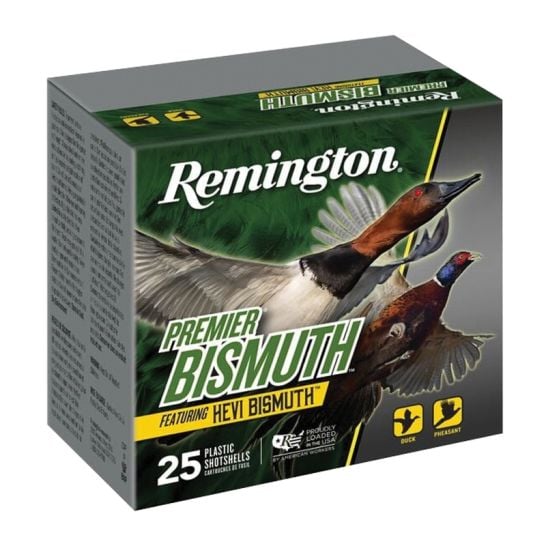
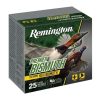
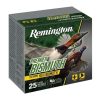
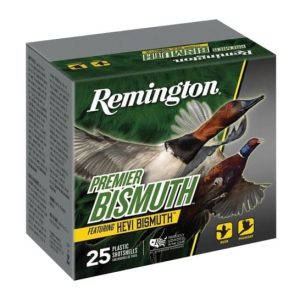
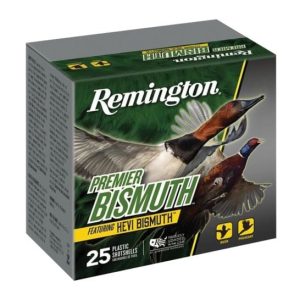
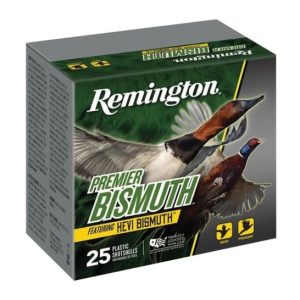
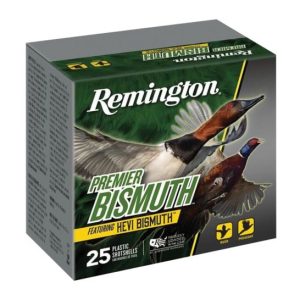
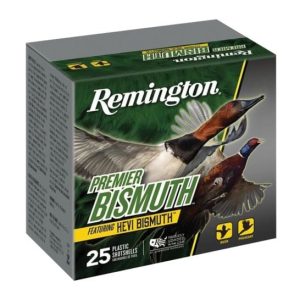
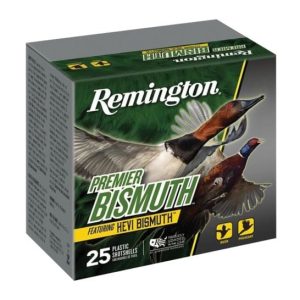
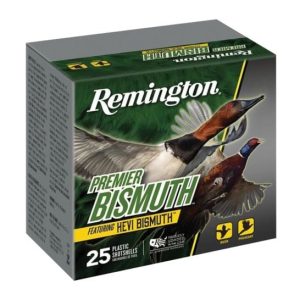
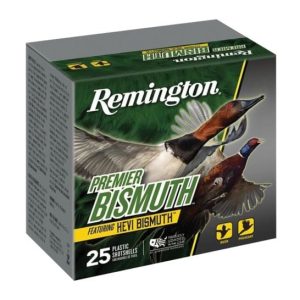
Reviews
There are no reviews yet.